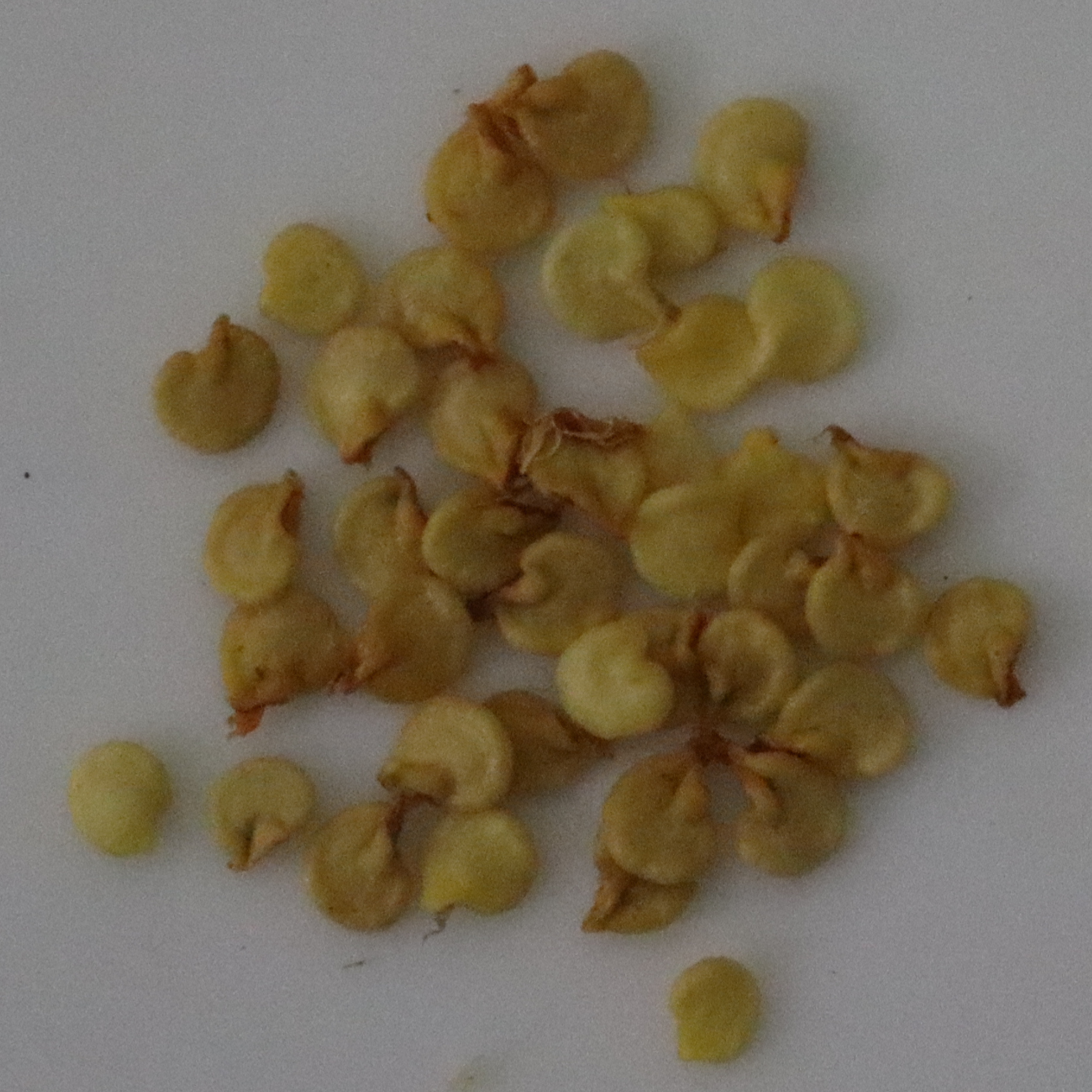

Product Description - Organic Purple Chilli Seeds - Open Pollinated
The purple chilli plant (botanical name: Capsicum annuum) is grown indoors as an annual plant, though it is a perennial in the right conditions. They are additionally referred to as the Christmas pepper plant. It is one of the most unique and beautiful chilli varieties on the planet. They produce an abundance of lovely purple and white flowers as well as stunning long purple hot peppers. As the pods ripen, they change colour from a lovely purple to yellow, orange, and glossy red. This colour transformation will create a stunning masterpiece that you will adore.
It is a rare and stunning spicy hot chilli that will brighten your garden with the foliage and the lovely purple fruit. This stunning chilli plant is a must-have for your garden.
The purple chilli is unquestionably an edible that has made the transition to the ornate. With a rainbow of coloured fruits and foliage, as well as a variety of shapes, these fast-growing summer peppers will make you feel as though you're on vacation every time you see them.
Benefits of purple chilli
purple chilli is used to flavour salsas, hot sauces, omelettes, rice and bean dishes, curries, and salads. Cook them in the same manner as you would with garlic to create a spicy base for any meal. Essentially, it is used as an ornamental plant in gardens.
Specifications of purple chilli seeds
|
Common Name |
purple chilli, Ornamental pepper, Christmas pepper |
|
Sunlight |
Full Sun |
|
Water |
Moist all time |
|
Temperature |
Cool temperatures from 55°F/13°C - 65°F/18°C are ideal during the night and 70°F/21°C - 80°F/26°C, during the day. Avoid lower than 55°F/13°C. |
|
Soil |
Rich loam |
|
Fertilizer |
Diluted liquid fertilizer |
|
Germination |
20 days |
|
Harvest Season |
when grown 90% |
|
No. of seeds |
20 - 50 seeds |
Planting and care for purple chilli
Sowing purple chilli seeds
You can grow purple chillies if you can grow tomatoes. Both thrive in direct sunlight and hot weather. One of the most frequent errors made when growing purple chillis is planting them too early in the season. Plants are frequently sold in garden centres before the weather is suitable for planting. If the time is right for outdoor swimming, the conditions are ideal for growing purple chillies outdoors.
Not only should all possibility of frost be eliminated, but nights should also be warm, with air temperatures of at least 60 degrees Fahrenheit, preferably higher. Before sowing seeds outdoors or transplanting nursery transplants, the soil temperature should be at least 70 degrees. It is generally recommended for gardeners to grow peppers from seeds to start them indoors.
Growing purple chilli
purple chillies flourish in containers. You can combine them with other ornamental plants that thrive in direct sunlight and heat, such as marigolds.
purple chillies have a small and shallow root system. A 6-inch grow bag is sufficient to hold a pepper plant, but keep in mind that a small grow bag will also dry out more quickly. Outdoors, a larger grow bag that can accommodate multiple plants or a mixed planting will be more successful, whereas indoor pepper plants will tolerate smaller grow bags. It's time to report if you require more than once daily watering of the plants.
If you want to develop purple chilli, beginning them from seed is a cost-effective way to obtain plants by the dozen. Start seeds in grow bags filled with Potting Mix - 100% Organic with 8 Fertilizers and 4 Beneficial Microbes and cover 1/2 inch of soil after about eight weeks. If necessary, use heating mats or soil warming cables to raise the temperature of the soil to 80 degrees Fahrenheit. Germination can take up to 20 days.
After germination, keep the seedlings slightly cooler until they are ready to be transplanted outdoors into the soil warmed to at least 70 degrees. Seedlings take approximately six to eight weeks to reach a good transplant size. Plant purple chillies approximately 12 inches apart in grow bags. When growing purple chilli plants, the flowering season necessitates an increase in fertilizer nutrients to sustain their growth. Recommend an Organic Humic Acid (Growth Promoter) that will supply the plant with everything required for root, foliage, and flower production. During the summer months, water with the solution every two weeks.
Harvesting purple chilli
As the days shorten and the temperatures fall in the fall, flowering slows, fruit production ceases, and the plant grows. After the peppers have dried, prune the plant to eliminate excess branches, shape the growth, and open the plant's centre. Retain the purple chilli plant until spring, when it begins to grow and flower again.
Precautions in growing purple chilli
- Peppers require fertile, well-draining soil to thrive.
- If the weather is scorching, water plants more frequently, but avoid allowing them to become damp.
- Mulch the growing area to keep it moist and deter weeds.
- Pruning these plants is optional if you want to promote a more compact form, but it is not required. Scrape the growth tips to encourage a more bushy plant.
Common problems and solutions in growing purple chilli
As with normal garden chillies, several insect pests, particularly aphids, spider mites, and thrips, can be a problem with purple chillies. Aphids and spider mites can be controlled using an insecticidal soap or a biopesticide. Thrips may require a biopesticide to control sucking pests, which is acceptable when purple chillies are grown for their fruit.
The most common fungal diseases that affect purple chillies are botrytis (grey mould) and Pythium root rot. Both are more likely to occur in wet conditions where airflow is restricted and saturated. Fungicidal sprays or powders such as Pseudomonas Fluorescens Bio Fertilizer and Trichoderma Viride Bio Fertilizer can aid in its control, as can cultural practises correction.






